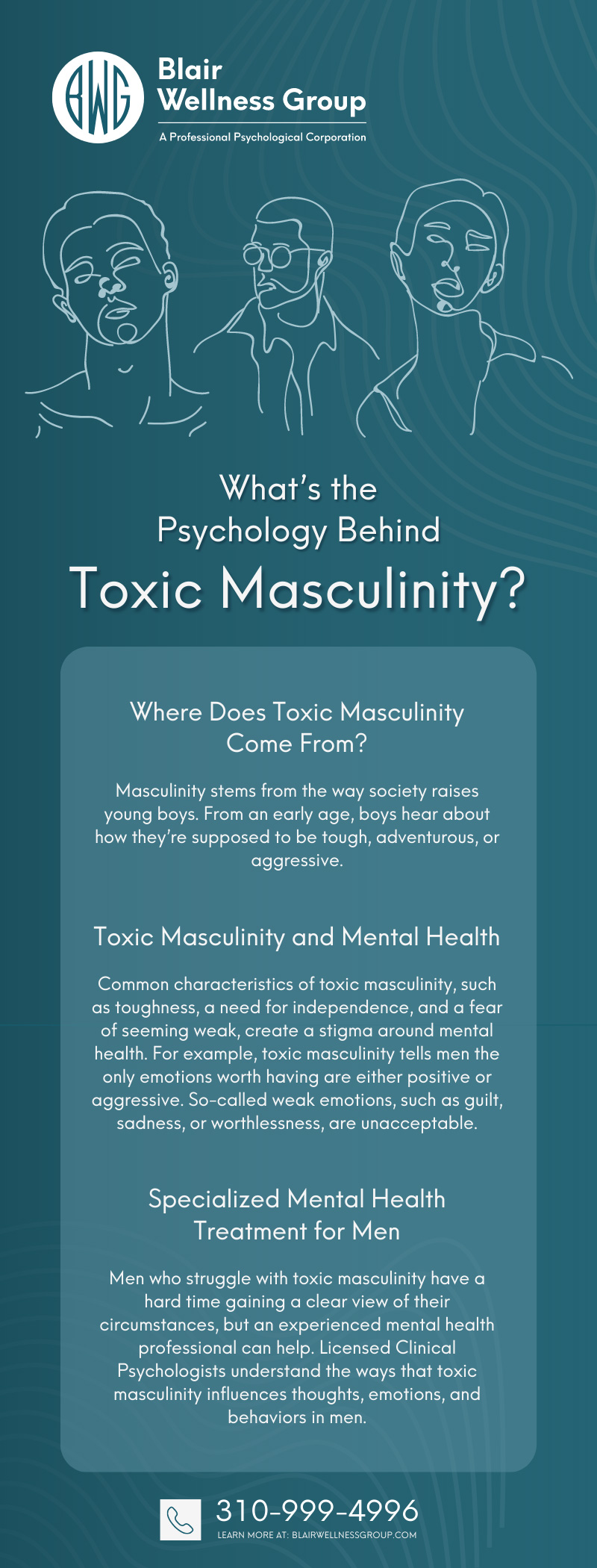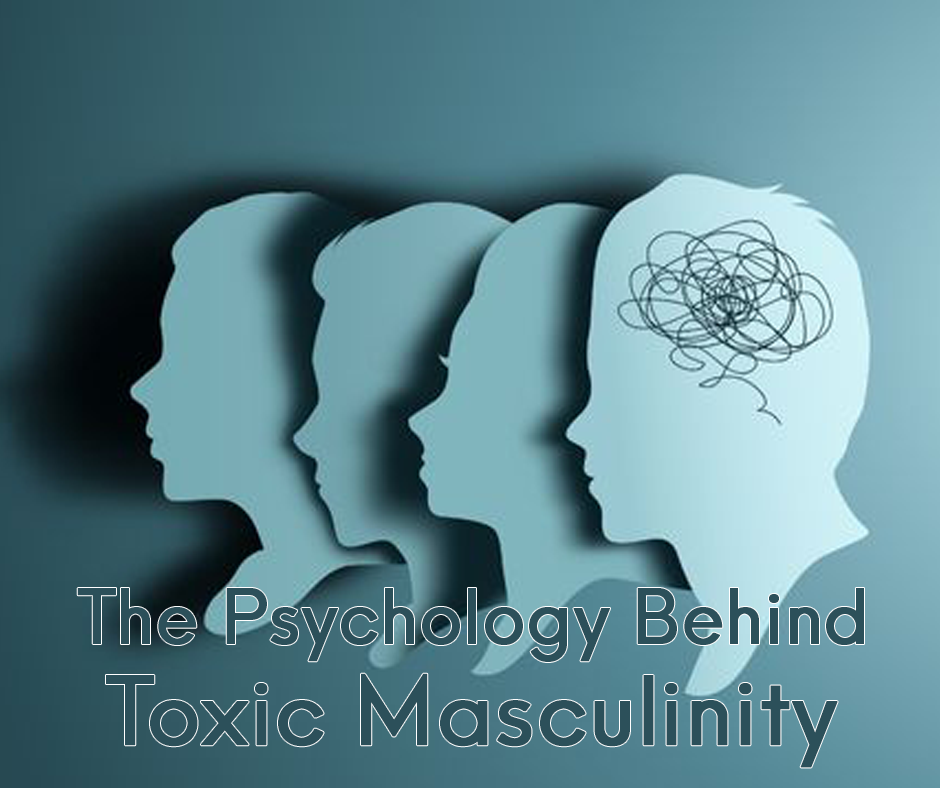Every culture has some form of gender roles that influence the way men and women think, feel, and behave. These roles are created and informed by traits that society views as either masculine or feminine. While masculinity and femininity aren’t inherently bad, the roles they create can harm or limit individuals. Even people who are aware and critical of gender roles still experience them.
Toxic masculinity is the result of harmful male gender roles. Understanding the social and psychological influences behind toxic masculinity is the key to identifying these traits and assessing how they are affecting your life. Learn more about the role toxic masculinity plays in society and in your life with this guide to the psychology behind toxic masculinity.
Masculinity vs. Toxic Masculinity
The term toxic masculinity—and the analysis and critique of gender roles in general—has become an incredibly relevant topic in recent years. Simply because people are talking about it, though, doesn’t mean the conversations surrounding toxic masculinity are accurate or productive. It’s important to have a clear understanding of both masculinity and toxic masculinity in order to effectively address the issue.
One common misconception is that masculine traits are inherently toxic. This isn’t true. However, when people take masculine traits to the extreme or prioritize exclusively masculine traits, it can lead to thought patterns and behaviors that harm men and the people around them.
For example, strength is a traditionally masculine trait. Strength is obviously a positive trait—it can make you capable and give you the power to protect others. In the context of toxic masculinity, though, strength means never allowing weakness. Prioritizing strength while fearing weakness leads to men acting dangerously competitive, taking on burdens without relying on others, or shutting down perceived weaknesses such as feelings of fear or sadness. These behaviors hinder mental and emotional well-being while promoting unhealthy thoughts and habits.
Toxic Masculinity in Practice
The core components of toxic masculinity revolve around traditionally masculine traits taken to an extreme. Physical strength becomes aggression, callousness, and intolerance for weakness. Independence becomes isolation and a refusal to offer or accept help to and from others.
It’s also important to note that toxic masculinity encourages a negative and often derisive view of non-masculine traits or behaviors, no matter who exhibits those behaviors. This leads to men criticizing or even harming women for non-masculine behaviors. However, men experiencing toxic masculinity can also turn that negativity and abuse toward other men who exhibit traits and behaviors that toxic masculinity perceives as weak.
Where Does Toxic Masculinity Come From?
Masculinity stems from the way society raises young boys. From an early age, boys hear about how they’re supposed to be tough, adventurous, or aggressive. In more extreme cases, parents or other authority figures might punish boys for not adhering to traditionally masculine gender roles. This teaches boys harmful lessons and creates dangerous behaviors and thought patterns that will follow them into adulthood.
While many boys learn toxic masculinity from their parents—especially fathers—it can stem from other influences as well. Family members, teachers, coaches, and other authority figures can pass on toxic masculine traits. Boys can also learn harmful thoughts and aggression from their peers in childhood and adolescence.
Toxic Masculinity and Mental Health
How does toxic masculinity influence men’s mental health? Common characteristics of toxic masculinity, such as toughness, a need for independence, and a fear of seeming weak, create a stigma around mental health. For example, toxic masculinity tells men the only emotions worth having are either positive or aggressive. So-called weak emotions, such as guilt, sadness, or worthlessness, are unacceptable. This makes mental health issues unacceptable as well.
Furthermore, toxic masculinity encourages men to suffer in silence when they experience physical or emotional pain. This prevents men from seeking professional help for mental health challenges. Even men who do start working with Licensed Clinical Psychologists might still struggle with being honest or vulnerable, which hinders patient treatment compliance and prevents them from experiencing the full benefits of treatment.
The psychology behind toxic masculinity allows Licensed Clinical Psychologists to better understand men’s unique relationships with mental health. That’s why it’s important to look at the common Mental Health Disorders men face, and how toxic masculinity influences diagnosis, symptoms, and more.
Depression
Depression is one of the most common Mental Health Illnesses in the world. Everyone experiences depression differently, but men who suffer from toxic masculinity face particularly unique struggles. The need to take care of yourself without showing weakness can exacerbate symptoms like loneliness and worthlessness. Meanwhile, mental health stigma caused by toxic masculinity prevents men from seeking the help they need to treat their Clinical Depression.
Toxic masculinity can also play a role in men’s suicidal ideations and behaviors. Even though women are more likely to experience Clinical Depression, men are more likely to die from suicide. This is potentially because an emphasis on strength or aggression leads to men using more deadly methods—such as firearms—when attempting suicide. For this reason, it’s crucial for men to seek treatment from a Licensed Clinical Psychologist to intervene with their Mood Disorders including Bipolar Disorder, Anxiety Disorders, and Clinical Depression.
Bipolar Disorder
Bipolar Disorder is another Mental Health Condition that suffers under the influence of toxic masculinity. Individuals with Bipolar Disorder experience extreme mood fluctuations, including highs of elation, restestless, irritability, or lethargy and withdrawal.
Toxic masculine traits make it difficult to accurately diagnose Bipolar Disorder in men. Symptoms like feeling overconfident, reckless, or aggressive during emotional highs and withdrawing during emotional lows apply to both toxic masculinity and Bipolar Disorder. As a result, many men with Bipolar Disorder mistake their circumstances for normal male behavior rather than the indicators of a Mental Health Illness.
Specialized Mental Health Treatment for Men
Men who struggle with toxic masculinity have a hard time gaining a clear view of their circumstances, but an experienced mental health professional can help. Licensed Clinical Psychologists understand the ways that toxic masculinity influences thoughts, emotions, and behaviors in men. Working with a Licensed Clinical Psychologist is the key to deconstructing toxic masculinity and healing from its influence in your life.
Dr. Blair is an experienced Licensed Clinical Psychologist offering evidence-based mental health treatments, including depression treatment, in Newport Beach, Irvine, and its surrounding areas. Discover the difference professional treatment can make in your life when you make an appointment with Blair Wellness Group today.















